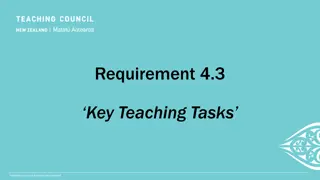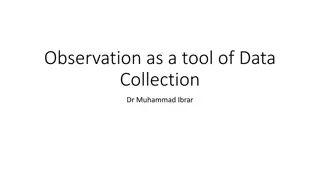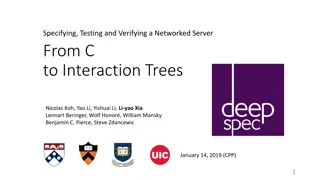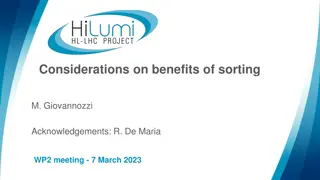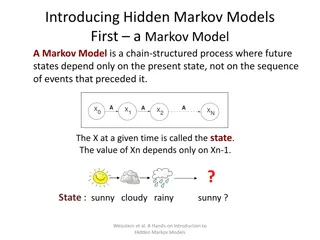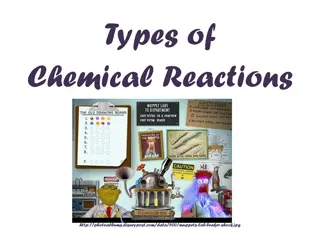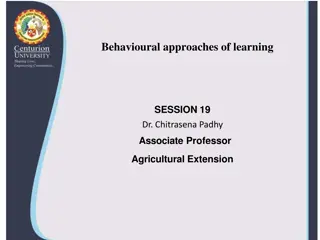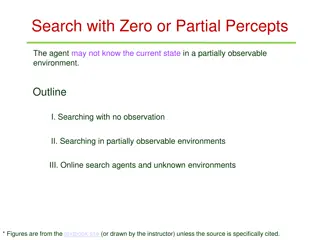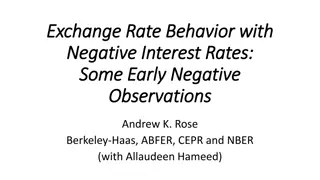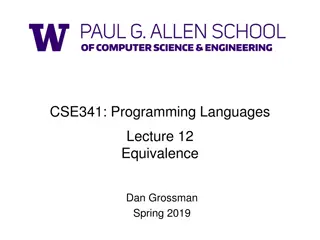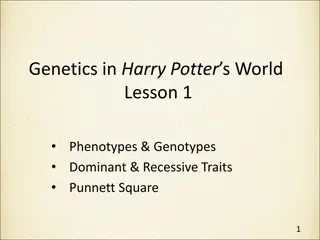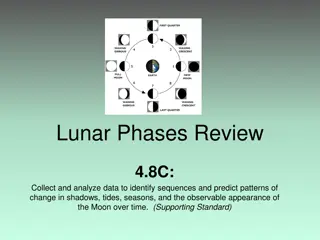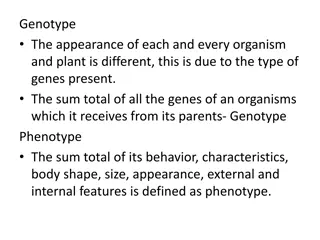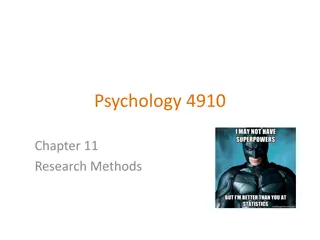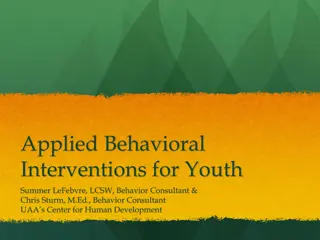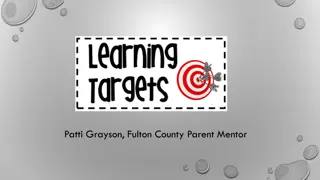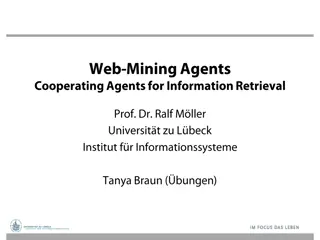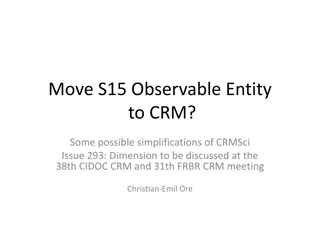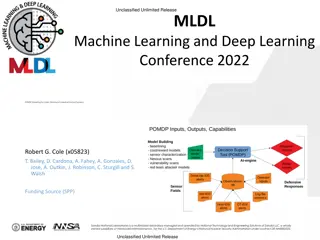Moving Towards Fully Ensemble-Derived Background-Error Covariances for NWP at ECCC
The transition from hybrid covariances to fully ensemble-derived background-error covariances for Numerical Weather Prediction (NWP) at Environment and Climate Change Canada (ECCC) is explored in this paper. It discusses the evolution of covariance formulations, the use of scale-dependent localizati
1 views • 20 slides
Exploring Mental Health Categories and Disorders
In today's categories, we delve into themes like stigma, recovery, myths, and facts surrounding mental health. We discuss various disorders including psychotic disorders and observable signs like hallucinations, delusions, and flat affect. Discover the signs and symptoms of mood disorders and high/l
1 views • 71 slides
Ancient Healing Practices and Theories in Medicine
Explore the ancient practices and theories in medicine, including the fascinating rituals of Asklepiadic incubation and the blending of magic and science in ancient healing. Delve into the application of observable events explained in terms of non-observables, effects produced through manipulation,
4 views • 75 slides
Understanding Human Behavior: Foundations and Complexity
Human behavior encompasses the actions and interactions of individuals influenced by factors like genetics, culture, and situational contexts. It involves observable overt behaviors as well as hidden covert behaviors, with a dynamic interplay between individuals and their environments. Psychologists
8 views • 20 slides
INTRO TO FBA
Explore the foundational principles of Applied Behavior Analysis (ABA) through the lens of behaviorism, beginning with B.F. Skinner's theories on observable behavior. Learn about positive reinforcement, negative reinforcement, positive punishment, and negative punishment, and how these concepts shap
4 views • 45 slides
Classifying Changes as Physical or Chemical
The content provides examples of scenarios involving bread, toasting, and coiling a wire, prompting readers to classify each change as a physical or chemical change. The explanations for each example are supported with evidence, helping readers understand the distinction between the two types of cha
0 views • 13 slides
Responsible Wildlife Interaction Guidelines
Learn when and how to help a wild animal, understand ethical responsibilities in wildlife rehabilitation, identify observable diseases, and know who to contact when encountering a sick or injured animal. Recognize signs of distress in baby animals and proper actions to take if you find an injured or
0 views • 19 slides
Key Teaching Tasks and Partnerships in Assessment Framework
The assessment framework for teacher training programs must include a set of 10-15 key teaching tasks that new teachers should be capable of performing on their first day on the job. These tasks need to align with teaching standards, be observable and measurable, and connect directly to working with
1 views • 13 slides
Understanding Psychology: The Science of Behavior and Mental Processes
Psychology is the scientific study of behavior and mental processes. Psychologists study both observable behavior and private mental processes. The primary goals of psychology are to describe, understand, predict, and control behavior. Different branches of psychology, such as applied psychology, cl
2 views • 29 slides
Understanding Observation as a Data Collection Tool in Behavioral Science
Observation method serves as a crucial tool for data collection in behavioral science, enabling researchers to systematically record and analyze observable phenomena. This method involves recording behavior patterns without direct interaction, providing in-depth insights into natural settings and in
0 views • 12 slides
Networked Server Verification Using Interaction Trees
This paper explores the process of specifying, testing, and verifying a networked server from C to interaction trees. It discusses the main contributions, including verifying a networked C program using VST and running in CertiKOS. The paper also delves into swap server specifications, observable be
0 views • 19 slides
Exploring Empiricism: Francis Bacon and Classical Perspectives
Empiricism, as championed by Francis Bacon, emphasizes the role of sensory experience in forming ideas over innate notions. It asserts that the human mind is like a tabula rasa, developing solely through observation and experimentation. Various forms of empiricism, such as explanatory and genetic em
0 views • 9 slides
Insights on Behavior-Based Safety Programs in the Workplace
Jon Birkes, an experienced professional in Safety, Health, and Environmental fields, discusses the psychology behind Behavior-Based Safety (BBS) programs. The content covers understanding and implementing effective BBS programs, with examples of significant improvements in safety performance in vari
0 views • 24 slides
Crafting Effective Learning Objectives Using Action Verbs
Crafting measurable learning outcomes involves focusing on student behaviors, using specific action verbs, selecting appropriate assessment methods, and setting clear performance criteria. The checklist provided emphasizes the importance of observable and measurable outcomes, incorporating active ve
7 views • 27 slides
Understanding Behavioral Therapy in Psychotherapeutics
Behavioral therapy focuses on observable behavior and learning experiences to bring about change and enhance skills. It is used to treat a wide range of psychological disorders and is applicable in various fields such as developmental disabilities, education, clinical psychology, and rehabilitation.
0 views • 20 slides
Optimizing Benefits Through Sorting in LHC Magnet Systems
LHC's experience highlights the significant advantages of sorting in magnet systems, such as safeguarding against losses in mechanical and dynamic apertures, minimizing beta-beating, and enhancing field quality. By controlling observable quantities like mechanical aperture, transfer function, and fi
0 views • 8 slides
Understanding Contingency Management in Substance Use Disorder Treatment
Contingency Management (CM) is a technique that utilizes positive reinforcement to encourage desired behaviors, such as abstinence from stimulants. By offering rewards like vouchers or prizes for achieving goals like submitting stimulant-free urine samples, CM aims to combat the positive and negativ
0 views • 6 slides
Insights into Tracking Reconstruction Effects of Admixed Backgrounds by Benjamen Sterwerf
This research delves into the impact of admixed background effects on tracking reconstruction, utilizing an analysis pipeline to study observable distributions and analysis plots. The study incorporates the HEPMC admixing code for background effects, with a focus on three main background types. It a
11 views • 20 slides
Introduction to Markov Models and Hidden Markov Models
A Markov model is a chain-structured process where future states depend only on the present state. Hidden Markov Models are Markov chains where the state is only partially observable. Explore state transition and emission probabilities in various scenarios such as weather forecasting and genetic seq
2 views • 12 slides
Understanding Different Types of Chemical Reactions
Chemical reactions involve the transformation of reactants into products. This comprehensive guide covers various types of reactions, including synthesis, decomposition, single-replacement, double-replacement, and combustion. Each reaction type is explained with examples and observable evidence such
0 views • 11 slides
Understanding the How Fully Enquiry Skills Question
Learn how to answer the "How Fully" enquiry skills question, where you analyze a source to determine if it fully explains a topic or if information is missing. Get insights on structuring your answer and identifying key points. Practice with a sample question based on a slave captain's journal regar
0 views • 15 slides
The Evolution of Naturalist Thinking in Classical Western Thought
The Naturalist Movement marked a shift in Greek philosophy towards rational study of the natural and moral order, departing from mythological explanations. Philosophers like Aristotle emphasized rational investigation over mythological beliefs, identifying nature with matter. They sought to discern
0 views • 10 slides
Understanding Behavioral Approaches of Learning
The behavioral approach to learning examines how observable behaviors are influenced by environmental factors. It emphasizes the role of stimuli and reinforcement in shaping behavior through classical and operant conditioning. Classical conditioning, illustrated by Pavlov's dogs, involves associatio
0 views • 9 slides
Zero or Partial Percepts in Search
In the context of search with zero or partial percepts, agents may not have complete information about the current state in a partially observable environment. This article outlines the challenges of searching in such scenarios, including situations where agents have no observations or only partial
0 views • 20 slides
Understanding Exchange Rate Behavior with Negative Interest Rates: Early Observations by Andrew K. Rose
In this study, Andrew K. Rose examines the exchange rate behavior in economies with negative nominal interest rates, focusing on the impact and implications of such rates on exchange rates. The findings suggest limited observable consequences on exchange rate behavior, with similarities in shocks dr
0 views • 42 slides
Understanding Equivalence in Programming Languages: CSE341 Lecture Summary
In CSE341's Programming Languages lecture, Equivalence is explored as the fundamental software engineering concept of determining if two pieces of code are equivalent. The focus is on code maintenance, backward compatibility, optimization, and abstraction. Equivalence is defined by having the same o
1 views • 14 slides
Understanding Genetics in Harry Potter's World
Explore the inherited genetic traits in the Harry Potter series, including phenotypes and genotypes of characters like the Weasleys, Draco Malfoy, and Harry Potter. Delve into observable traits like freckles, hair color, eye color, and height, and learn how to apply genetics concepts through example
0 views • 29 slides
Explore Lunar Phases and Patterns in Astronomical Observations
Dive into the study of lunar phases, shadows, tides, seasons, and the moon's observable appearance over time. Test your knowledge with questions about moon phases, identify the sequence of moon phases, understand the causes behind moon phases, and determine the correct order of moon phases. Enhance
0 views • 13 slides
Understanding Genotype and Phenotype: The Genetic Basis of Organism Variation
Genotype determines the genetic makeup of an organism, while phenotype encompasses its observable traits. Johannsen's theory states that phenotype is a result of genotype, which remains constant throughout life. The concept of phenocopy refers to mimicking another phenotype without altering the geno
0 views • 15 slides
Evolution of Research Methods in Psychology
The evolution of research methods in psychology is marked by significant developments such as introspection in the 19th century, logical positivism in the 1920s, and the emphasis on falsifiability and operational definitions. This evolution influenced how psychologists approached gathering knowledge
0 views • 25 slides
Understanding Applied Behavior Analysis (ABA) for Youth Interventions
Applied Behavior Analysis (ABA) is a science focusing on improving human behavior by increasing desired behaviors, teaching new skills, and generalizing behaviors. ABA emphasizes observable behaviors, measurement of behavior change, and the use of interventions in various settings like classrooms an
0 views • 25 slides
Importance of Learning Targets in Educational Settings
Learning targets play a crucial role in guiding educational sessions by outlining what learners are expected to achieve and how they will demonstrate their learning. They help keep everyone focused, aid in data collection for target groups, and act like GPS directions for learning goals. Learning ta
0 views • 18 slides
Exploring Chess Strategies and Environments in AI
Dive into the world of chess AI with a focus on different strategies and environments such as playing with a clock, deterministic scenarios, and more. Explore the nuances of fully observable, episodic, and discrete environments in AI chess applications.
0 views • 38 slides
Understanding Motivation and Change in Fall 2013
Delve into the various aspects of motivation and change in Fall 2013, exploring theories like Achievement Motivation Theory, Self-Determination Theory, Operant Conditioning, and Motivational Interviewing. Discover the complexities of motivating individuals and draw inspiration from historical events
0 views • 130 slides
Comparison of Observable Entities in CRM and CRMSci
In this content, different aspects of observable entities in CRM and CRMSci are discussed, including measurements, assignments, simplifications, and adjustments. The evolution and implications of observable entities within these frameworks are explored through various dimensions and properties, shed
0 views • 7 slides
Unveiling the Significance of the EPR Paradox and Bell's Inequalities
Physicists Albert Einstein, Boris Podolsky, and Nathan Rosen introduced the EPR paradox in 1935 to challenge the completeness of quantum mechanics through a thought experiment, highlighting issues in quantum entanglement and observable properties. Bohr's reaction emphasized the incompatibility of EP
0 views • 9 slides
Quarkonia Suppression in High Energy Heavy Ion Collisions by Roland Katz
Investigating the phenomenon of Quarkonia suppression in high energy heavy ion collisions, Roland Katz explores the properties of Quark Gluon Plasma and the behavior of quarks and gluons under extreme conditions. The study delves into the dynamics using the Schrödinger-Langevin equation, highlighti
0 views • 23 slides
Effective Lesson Planning Guidelines
Explore the key principles for effective lesson planning, starting with understanding the Infant Toddler Frameworks and progressing to choosing relevant benchmarks and writing measurable objectives. Learn how measurable objectives guide instructional activities and materials selection, focusing on s
0 views • 26 slides
Matched Control Group Load Impact Estimation Methodology Overview
A matched control group consists of customers similar to those in a treatment group but not subjected to the treatment. This methodology is useful when an experimentally designed control group is unavailable, there is a large pool of eligible control customers, or the treatment is not event-based. T
0 views • 12 slides
Decision Support System Development for SCADA/ICS Cyber Defense
Developing a Decision Support System (DSS) powered by Partially Observable Markov Decision Processes (POMDP) to aid novice cyber defenders in protecting critical SCADA/ICS infrastructure. The system leverages Domain Expertise, AI Expert System Shell, and emulation environments for testing and valida
0 views • 7 slides







